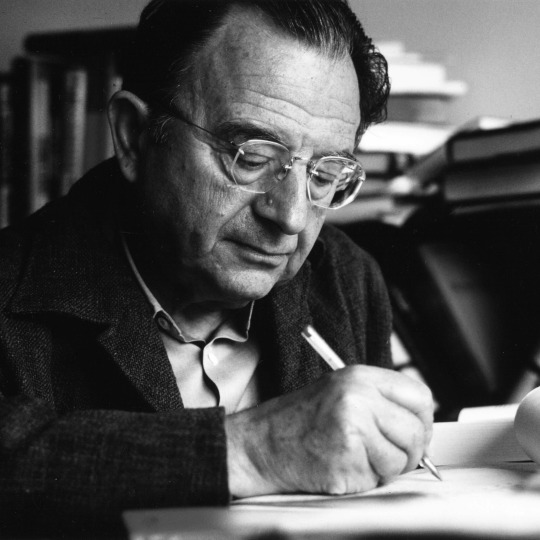#Erich Fromm
Text
If a person loves only one other person and is indifferent to the rest of his fellow men, his love is not love but a symbiotic attachment, or an enlarged egotism. Yet, most people believe that love is constituted by the object, not by the faculty. In fact, they even believe that it is a proof of the intensity of their love when they do not love anybody except the "loved" person. [...] Because one does not see that love is an activity, a power of the soul, one believes that all that is necessary to find is the right object — and that everything goes by itself afterward. This attitude can be compared to that of a man who wants to paint but who, instead of learning the art, claims that he has just to wait for the right object, and that he will paint beautifully when he finds it. If I truly love one person I love all persons, I love the world, I love life. If I can say to somebody else, "I love you," I must be able to say, "I love in you everybody, I love through you the world, I love in you also myself."
/ Erich Fromm, The Art of Loving
#quotes#erich fromm#love#books#books and reading#relationship#psychology#social psychology#philosophy#texts
28 notes
·
View notes
Text
Man is the only animal for whom his own existence is a problem which he has to solve.
Erich Fromm
#erich fromm#fromm#quotes#philosophy#wisdom#life#literature#writer#books#psychology#write#art#artist#idea#ideas#man the animal#existentialist#existentialism
217 notes
·
View notes
Text

“Love is the only sane and satisfactory answer to the problem of human existence.”
— Erich Fromm
#erich fromm#literature#lit#literature lover#literature quote#literature quotes#philosophy#philosophical#philosopher#philosophers#philosophy of life#philosophy quote#philosophy quotes#quote#quotes#excerpts#excerpt#quoteoftheday#booklover#book#bookworm#books#booklr#love quote#love quotes#lovers#love
152 notes
·
View notes
Text
THE ART OF LOVING
For many years I have been on the quest for a piece of literature that would describe love to me. and as a lover of love I can finally say that I have found the closest description of love while relating it to important themes that evoke critical thinking. At first, I had a fair anxiety about finding this book to be nothing but a cliché self-help book that has a rather repetitive fashion and does not present new ideas to the question of "What essentially is love, and how can it be practiced?"
Erich Fromm succeeded in opening my mind up to the importance and the indispensability of self-discipline, of facing the harsh reality of things, and the way present socio-economic structures have affected our views on relationships. He proceeds to define the current human experience as an alienation of Man from his true essence; prioritizing pleasure that not only does not fulfill Man but empties him and leaves him shallow. On page 68, he states "Man's happiness today consists of 'having fun'. Having fun lies in the satisfaction of consuming and 'taking in' commodities, sights, food, drinks, cigarettes, people, lectures, books, movies - all are consumed, swallowed. The world is one great object for our appetite, a big apple, a big bottle, a big breast; we are the sucklers, the eternally expectant ones, the hopeful ones - and the eternally disappointed ones." We can sense bits of Aldous Huxley's Brave New World in that quote as it can be correlated to how society, especially consumer culture, has allowed us to take in pleasures in life that aren’t that essential to our 'raison d'être' or meaning to life. Everything has become so accessible, it has been taken for granted. Additionally, capitalist society has turned love into a profitable project rather than a fundamental human and universal experience that needn’t be marketed.
The author has also debunked many myths about what a successful marriage can be based on and what it can consist of. "One of the most significant expressions of love, and especially of marriage with this alienated structure, is the idea of the 'team'," he writes. Marriage is an institution that has recently fallen victim to doubt and questioning by society. Is marriage the legitimate manifestation of love? Is it the last reachable goal in people's relationships? Why is it unsuccessful then? Questions with possible answers that Fromm has explored in his 3rd chapter (Love and Its Disintegration in Contemporary Western Society).
Furthermore, the discussion gets stretched to a very interesting and rather crucial point of any conversation or analysis; God's place within the topic of love. In the chapter 'The Theory of Love', Erich Fromm goes into all possible kinds of love, and the part called 'Love of God' is the most intriguing. The author writes about the religious and spiritual aspects of the phenomenon of love. Summoning Taoism, Man's relation to God, and so on. "Thus paradoxical logic leads to the conclusion that the love of God is neither the knowledge of God in thought, nor the thought of one's love of God, but the act of experiencing the oneness with God."
Overall, 'The Art of Loving' has imprinted its ideas and sentences in my brain like tattoos. It gave me incitement to take control over my life and my relationships; to exercise love in its purest form and wish nothing in return, and to practice the art of living as well as the art of loving.
#erich fromm#poem#poetry#quotes#writing#feeling#passionate#romantic#books#couple goals#books & libraries#book quotes
156 notes
·
View notes
Photo

Erich Fromm, The Anatomy of Human Destructiveness
1K notes
·
View notes
Quote
Ni el analista ni ningún hombre puede salvar a otro ser humano. Puede actuar como guía, puede mostrar el camino, quitar obstáculos y algunas veces prestar alguna ayuda directa, pero nunca puede hacer por el paciente lo que sólo el paciente puede hacer por sí mismo
Erich Fromm
#editions#frases#notas#citas#erich fromm#pop#arte#literatura#libros#textos#español#quotes#post#psicologia#reflexiones#filosofia#pensamientos#sentimientos#escritos#writings#cultura#sociedad#relaciones#amistad#amor#drama#vida#verdad#autoayuda#autoestima
1K notes
·
View notes
Quote
The fact that millions of people share the same vices does not make these vices virtues, the fact that they share so many errors does not make the errors to be truths, and the fact that millions of people share the same form of mental pathology does not make these people sane.
Erich Fromm
88 notes
·
View notes
Text
Las mismas palabras [por ejemplo, un hombre dice a su mujer, `te amo'] pueden ser triviales o extraordinarias según la forma en que se digan. Y esa forma depende de la profundidad de la región en el ser de un hombre de donde procedan, sin que la voluntad pueda hacer nada. Y, por un maravilloso acuerdo, alcanzan la misma región en quien las escucha.
Simone Weil
125 notes
·
View notes
Text


" İyi insan, aklından hiç kötülük geçirmeyen saf insan değildir. İyi insan, her kötülüğün farkında olup iyiliği tercih edendir..”
#erich fromm#alıntı#postlarım#my post#beauty#edebiyat#kitap#kitap alıntıları#kitaplar#hayata dair#anlamlı sözler#anlamlı yazılar#sevdiğim sözler#cat#cat lovers
143 notes
·
View notes
Quote
To love somebody is not just a strong feeling—it is a decision, it is a judgment, it is a promise. If love were only a feeling, there would be no basis for the promise to love each other forever. A feeling comes and it may go.
The Art of Loving, Erich Fromm
#the art of loving#erich fromm#on love#literature#dark academia#light academia#classic academia#romantic academia#lovecore
1K notes
·
View notes
Text
"Olgunlaşmamış sevgi "seni seviyorum çünkü sana ihtiyacım var" der. Olgunlaşmış sevginin söylediği ise "sana ihtiyacım var çünkü seni seviyorum"dur."
#erich fromm#kitap#kitap alıntıları#kitap alıntısı#kitap alintilari#kitap sözü#kitap kesitleri#kitapalintisi#kitapaşkı#kitapkokusu#kitapkurdu#geceye not#geceye bir söz bırak#my post#postlarim#postlarım#post#spotify#aşk#love#lovers#sevgi#kitaplayasamak#kitaplar#kitaplık#kitapokumak#kitapsevgisi#kitaptansözler#kitapsözleri#kitaptan alıntı
69 notes
·
View notes
Text
"Sevmek bir eylemdir; edilgen bir duygu değil. Bir şeyin "içinde olmaktır", bir şeye "kapılmak" değil."
116 notes
·
View notes
Text

“While every human being has a capacity for love, its realization is one of the most difficult achievements.”
— Erich Fromm
#erich fromm#literature#lit#literature lover#literature quote#literature quotes#philosophy#philosophical#philosopher#philosophers#philosophy of life#philosophy quote#philosophy quotes#quote#quotes#excerpts#excerpt#quoteoftheday#booklover#book#bookworm#books#booklr#book quotes#book quotations
91 notes
·
View notes
Text
Modern capitalism needs men who cooperate smoothly and in large numbers; who want to consume more and more; and whose tastes are standardized and can be easily influenced and anticipated. It needs men who feel free and independent, not subject to any authority or principle or conscience — yet willing to be commanded, to do what is expected of them, to fit into the social machine without friction; who can be guided without force, led without leaders, prompted without aim — except the one to make good, to be on the move, to function, to go ahead.
What is the outcome? Modern man is alienated from himself, from his fellow men, and from nature. He has been transformed into a commodity, experiences his life forces as an investment which must bring him the maximum profit obtainable under existing market conditions. Human relations are those of alienated automatons, each basing his security on staying close to the herd, and not being different in thought, feeling or action. While everybody tries to be as close as possible to the rest, everybody remains utterly alone, pervaded by the deep sense of insecurity, anxiety and guilt which always results when human separateness cannot be overcome.
Our civilization offers many palliatives which help people to be consciously unaware of this aloneness: first of all the strict routine of bureaucratized, mechanical work, which helps people to remain unaware of their most fundamental human desires, of the longing for transcendence and unity. Inasmuch the routine alone does not succeed in this, man overcomes his unconscious despair by the routine of amusement, the passive consumption of sounds and sights offered by the amusement industry; furthermore by the satisfaction of buying ever new things, and soon exchanging them for others.
Modern man is actually close to the picture Huxley describes in his Brave New World: well fed, well clad, satisfied sexually, yet without self, without any except the most superficial contact with his fellow man […].
Man's happiness today consists in "having fun". Having fun lies in the satisfaction of consuming and "taking in" commodities, sights, food, drinks, cigarettes, people, lectures, books, movies — all are consumed, swallowed. The world is one great object for our appetite, a big apple, a big bottle, a big breast; we are the sucklers, the eternally expectant ones, the hopeful ones — and the eternally disappointed ones. Our character is geared to exchange and to receive, to barter and to consume; everything, spiritual as well as material objects, becomes an object of exchange and of consumption.
— Erich Fromm, The Art of Loving (1956)
#erich fromm#aldous huxley#brave new world#the art of loving#capitalism#consumerism#spirituality#psychology#quotes#book quote#quoteoftheday#life quote
35 notes
·
View notes
Text
Man is the only animal for whom his own existence is a problem which he has to solve and from which he cannot escape.
Erich Fromm
77 notes
·
View notes
